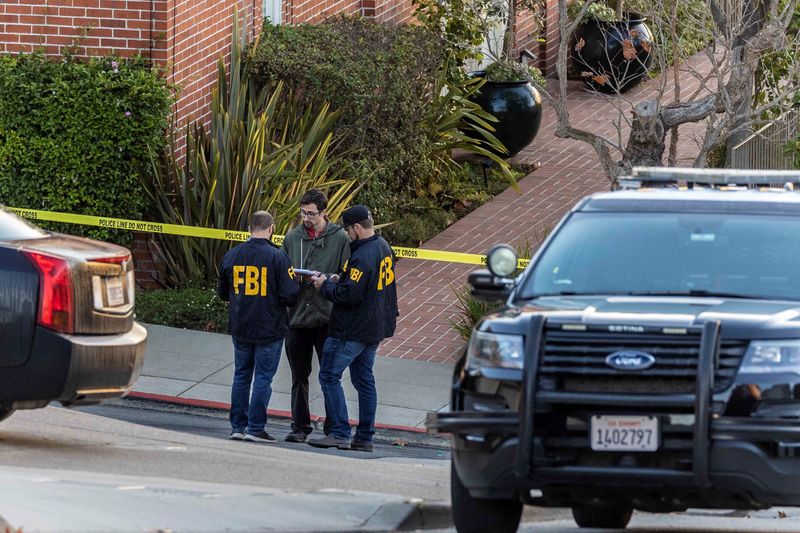Hate speech, online extremism fed Pelosi attack, terror experts believe
2022.10.29 14:04
[ad_1]

© Reuters. FILE PHOTO: FBI agents work outside the home of U.S. House Speaker Nancy Pelosi where her husband Paul Pelosi was violently assaulted after a break-in at their house, according to a statement from her office, in San Francisco, California, U.S., October 28
By Heather Timmons
WASHINGTON (Reuters) – The frequent targeting of U.S. House Speaker Nancy Pelosi by online extremists and political opponents likely contributed to the violent attack on her husband Paul, terrorism and extremism experts said.
The intruder at the Pelosis’ home yelled “Where’s Nancy?” before assaulting Paul Pelosi with a hammer, according to a person briefed on the incident. An internet user with the same name as the man arrested at the scene, David Depape, expressed support for former President Donald Trump and embraced the cult-like conspiracy theory QAnon in online posts that referenced “satanic paedophilia.”
Police have yet to comment on a motive in the attack.
But terrorism and extremism experts believe it could be an example of the growing threat of so-called stochastic terrorism, in which sometimes unstable individuals are inspired to violence by hate speech and scenarios they see online and hear echoed by public figures.
“This was clearly a targeted attack. The purpose was to locate and potentially harm the speaker of the house,” said John Cohen, a former counterterrorism coordinator and head of intelligence at the Department of Homeland Security, who is currently working with state and local law enforcement across the country on the issue.
“This is a continuation of a trend that we have been experiencing over the past several years. It is a threat dynamic that has law enforcement extraordinarily concerned.”
Pelosi has been demonized online and in public by both far right and far left-leaning political websites and figures. Graphics depicting her being beheaded, and a call to send immigrants to her home, with her address, circulated online this summer, according to Site Intelligence Group, which researches online extremism.
Rita Katz, executive director of Site, said the Speaker was a hate figure for much of the political right, and is the “face of the Democratic establishment and, as such, at the center of many QAnon-adjacent conspiracy theories.”
Those theories and people who espouse them are sometimes promoted by more mainstream public figures, amplifying the threats, experts say.
“While the intent may be to mobilize one’s political base or generate ratings it also adds to the volatility of the threat environment,” said Cohen.
Individual attackers, sometimes known as “lone wolves” frequently combine personal with political grievances and are reinforced and radicalized by things they read online, the DOJ’s research arm The National Institute of Justice reports.
Attacks on political figures, places of worship and races or ethnicities have occurred in the United States for decades, but law enforcement professionals say the current environment is particularly dangerous.
“Today’s radical extremism threat has this powerful digital component that can really accelerate recruitment and activate violence across a broader threat landscape,” Aisha Qureshi, a social science analyst at the National Institute, said in an agency podcast before the Pelosi attack.
“Just the sheer volume and speed of misinformation spread through social media really exacerbates this problem,” she said.
Threats against political leaders are rising in the United States. Cases related to “concerning statements and threats” against members of Congress jumped from 3,939 in 2017 to 9,625 in 2021, according to the U.S. Capitol Police.
“Look at the FBI attack in Ohio,” said Todd Helmus, a senior behavioral scientist at security research firm Rand Corp., referring to an August incident when an armed man tried to break into the Cincinnati FBI headquarters.
Helmus linked that incident to rhetoric surrounding the FBI’s removal of classified documents from Trump’s Florida estate. Site said the Pelosi attack was being celebrated online by far-right supporters.
“We’re just waiting for more of these things to occur,” said Helmus.
[ad_2]
Source link








